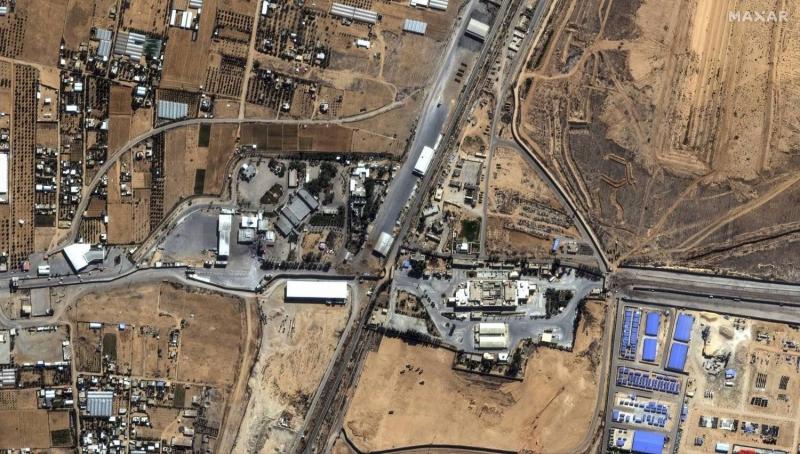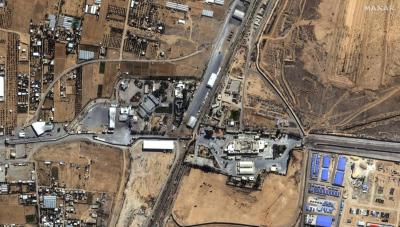The Rafah crossing between Gaza and Egypt is the only entry point for aid from outside Israel directly to the Gaza Strip and the only exit that does not lead to Israeli territory. The crossing has become a focal point in the escalating conflict between Israel and the Palestinian Islamic resistance movement (Hamas), as hundreds of thousands of Palestinians have flocked to southern Gaza after being urged by Israel to leave the city and northern strip.
The crossing is located in the southern part of the Gaza Strip, a narrow strip of land inhabited by 2.3 million people, situated between Israel, Egypt, and the Mediterranean Sea. Egypt controls the crossing. In response to Hamas militants breaking through the border on October 7, which resulted in the deaths of over 1,300 Israelis, Tel Aviv imposed a "complete siege" on Gaza, cutting off electricity and blocking all food and fuel supplies to the region. This means that the only potential route for delivering humanitarian aid to Gaza is through Rafah from Egypt's Sinai Peninsula. The crossing also serves as the only exit point for residents of the strip seeking to flee. It is anticipated that foreign passport holders will be allowed to leave under any agreement to reopen the crossing, prompting them to head to the adjacent area in recent days in hopes of departure. Israel has also requested that Gaza's residents move southward near Rafah for safety from bombing, but the population claims there is no safe place in the overcrowded strip.
What are the reasons behind the restrictions on crossing at Rafah? Egypt is concerned about security near the border with Gaza in northeastern Sinai, where it has faced an Islamist insurgency peaking after 2013, which it has largely suppressed now. Since Hamas took control of Gaza in 2007, Egypt has tightened restrictions on the flow of people and goods. As is the case at the main crossings with Israel, restrictions are sometimes relaxed but are never fully lifted, requiring travelers to have security permits and undergo extensive inspections to cross. Tens of thousands of Palestinians crossed into Sinai in 2008 after Hamas opened breaches in the border fortifications, leading Egypt to build a stone and cement wall. Egypt has mediated between Israel and Palestinian factions during previous conflicts and periods of unrest, but it also closes the border in these cases, allowing only aid entry and people to exit for medical treatment, while preventing any large-scale movement of individuals. Even as Israel conducts its most intense bombardment of Gaza in response to Hamas's attack, Egypt has not shown any indication that it will alter its approach. Around three thousand Palestinians have been killed in the Israeli bombardment.
What efforts are being made to open the border? The United Nations has urged Israel to avoid a "humanitarian disaster" in Gaza, warning that food, fuel, and even drinking water supplies are critically depleting. Hospitals report severe difficulties in dealing with the wounded as fuel for backup generators runs out. Egyptian aid trucks approached the crossing recently, but it remains unclear when or if they will be able to pass into Gaza. U.S. Secretary of State Antony Blinken stated that the United States and Israel have agreed to devise a plan to deliver humanitarian aid to civilians in Gaza without benefiting Hamas.
Why are Arab countries hesitant to receive Palestinians? Arab nations are highly concerned that the ongoing Israeli war with Hamas in Gaza could lead to a new wave of permanent displacement from the territories where Palestinians seek to establish their state. Egypt and Jordan have warned against forcing Palestinians to leave their lands. Egypt is the only Arab country sharing a border with Gaza, while Jordan borders the Israeli-occupied West Bank. Egyptian President Abdel Fattah el-Sisi emphasized the importance of keeping the Palestinian people on their land, while Jordanian King Abdullah warned against any attempts to forcibly displace Palestinians from all Palestinian territories or cause their internal displacement. For Arabs and Palestinians, the idea of leaving lands that Palestinians want to establish their state on resonates with the memory of the "Nakba," when many Palestinians fled or were forced to leave their homes during the 1948 war that accompanied the establishment of Israel. Israel denies that it expelled Palestinians, claiming that five Arab countries attacked it after its state was established. Around 700,000 Palestinians, nearly half of the Arab population in Palestine under British rule, were displaced and forced from their homes, with many settling in neighboring Arab countries where they and their descendants still reside. Many continue to live in refugee camps. For this reason, many Palestinians say that they do not want to leave Gaza, which Israel withdrew from in 2005 after an occupation lasting 38 years, even as this latest conflict escalates.




